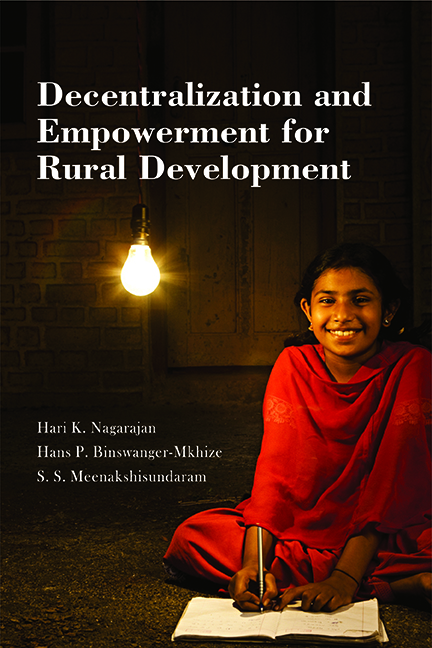Book contents
- Frontmatter
- Contents
- List of Tables and Figures
- Foreword 1
- Foreword 2
- Preface
- 1 Introduction
- 2 Decentralization: Cross-country Experiences
- 3 Thinking about Decentralization in India: 73rd Amendment and Beyond
- 4 Literature
- 5 An Overview of the Data
- 6 Analytical Approaches and Econometric Methods Used
- 7 Can Panchayats Improve the Quality of Services? Some Qualitative Evidence
- 8 Impact of Political Reservations for Women in Panchayats
- 9 Importance of Individual Empowerment of Women
- 10 Governance, Service Provision and Development Outcomes
- 11 The Impact of Fiscal Grants on Tax Efforts of Village Panchayats
- 12 Incidence of Identity-based Voting and Bribes in Panchayats
- 13 Panchayats and Household Vulnerability
- 14 Key Findings, Conclusions and Policy Recommendations
- References
- Index
- About the Authors
3 - Thinking about Decentralization in India: 73rd Amendment and Beyond
Published online by Cambridge University Press: 30 November 2022
- Frontmatter
- Contents
- List of Tables and Figures
- Foreword 1
- Foreword 2
- Preface
- 1 Introduction
- 2 Decentralization: Cross-country Experiences
- 3 Thinking about Decentralization in India: 73rd Amendment and Beyond
- 4 Literature
- 5 An Overview of the Data
- 6 Analytical Approaches and Econometric Methods Used
- 7 Can Panchayats Improve the Quality of Services? Some Qualitative Evidence
- 8 Impact of Political Reservations for Women in Panchayats
- 9 Importance of Individual Empowerment of Women
- 10 Governance, Service Provision and Development Outcomes
- 11 The Impact of Fiscal Grants on Tax Efforts of Village Panchayats
- 12 Incidence of Identity-based Voting and Bribes in Panchayats
- 13 Panchayats and Household Vulnerability
- 14 Key Findings, Conclusions and Policy Recommendations
- References
- Index
- About the Authors
Summary
Introduction
From chapter 2, one is made aware of a range of cross-country experiences with decentralization. That chapter also brought to fore the many mistakes various countries had made while engaging in reforms to their administrative structures. For example, it can be seen that most countries (barring Brazil) have not put in place mechanisms for creating fiscal buoyancy. Financial autonomy of local governments is always an issue in several countries. What is interesting to note is that even if all other factors related to decentralization are weak, the importance of fiscal decentralization and, in particular, the positive effects of local governments raising their own revenues are understood and often promoted. The principle of subsidiarity has been followed to varying extents in these countries. As always Brazil, and to a certain extent, Uganda have put in place mechanisms that will enable local governments to take decisions in matters that they obviously have advantage over the central government. There are also cases of de-concentration being passed off as decentralization and state capture of local governments as in Sri Lanka and Bangladesh.
What about India? Local bodies and institutions had started to decline after the fall of the various indigenous kingdoms and empires. In particular, institutions such as the panchayats that catered to the rural population all but disappeared by the middle of the fourteenth century. Over a significant period of time (starting in the late-thirteenth century in the northern part of India) village economies were slowly being converted into revenue centres for the urban areas. Participation by citizens in governance, accountability of the local administration in particular and local autonomy slowly vanished.
This change was further accelerated by the British. Along with this came economic decline and frequent famines (even by conservative estimates 25 million died between 1790 and 1890. Another 4 million died in famines between 1900 and 1945 when food produce from India was used to feed the British war efforts (Ambirajan, 1976). These deaths were caused by the near complete absence of relief efforts provided by the administration of the day (the British were in charge of the administration either directly or through their princely agents by the late-eighteenth century when the famines started).
- Type
- Chapter
- Information
- Decentralization and Empowerment for Rural Development , pp. 39 - 70Publisher: Foundation BooksPrint publication year: 2014



